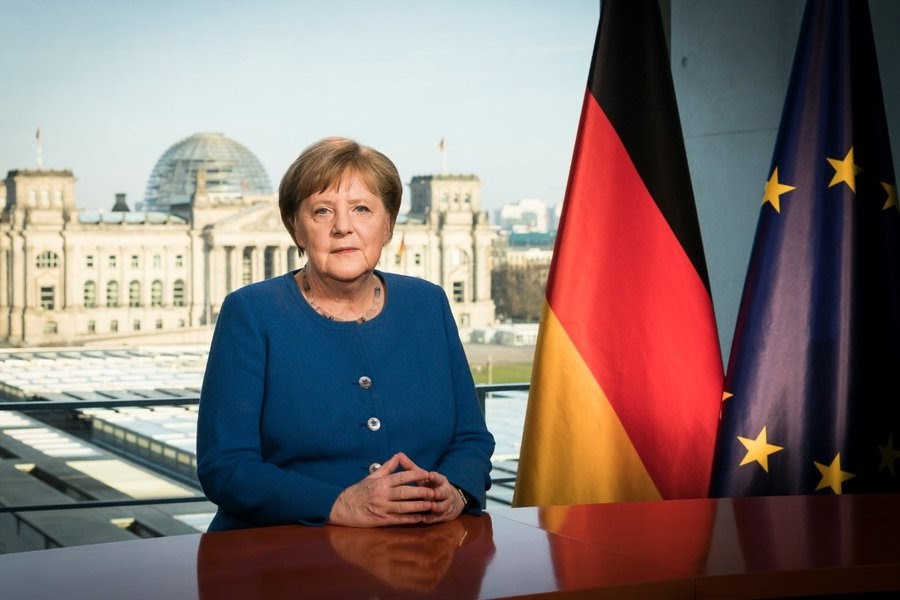Germany runs a tight ship — we should study it | The China Project COVID-19 updates for April 2, 2020

German Chancellor Angela Merkel addresses the nation regarding the coronavirus pandemic and the national response measures. Photo credit Getty Images.
Good evening readers,
China is where the coronavirus first jumped from animals to humans. Despite medical workers
having identified the virus sometime in November or December, and despite past brushes with similar epidemics, China delayed its response to the coronavirus. Its government was later forced to come down with severe countermeasures, and at this point it’s still not clear that those countermeasures were worth it. Their coronavirus problems may be bouncing back faster than their economy.
The U.S., for its part, didn’t mobilize a serious response until the middle of March — nearly two months after the first cases were reported inside the U.S. and almost three months after the first reports were making their way out of China. Even now, despite fervent efforts from the White House down to local town halls, the response still feels ad hoc and few people — including most government officials — have a clear understanding of what the big-picture plan is.
Africa, the Middle East, Europe, and South America are in varying states of preparedness or disarray. One country literally made the word “coronavirus” illegal and announced it has and will always have zero cases.
South Korea, Japan, and Singapore have been praised for their handling of the outbreak as they all have extremely low case counts and death counts at this point in time, although they are far from being in the clear yet.
Germany stands apart from all of these countries. It has not escaped the virus or prevented its spread. Indeed, Germany has a formidable outbreak on its hands, with more than 80,000 cases in the country.
Yet Germany’s medical, economic, and social responses have been methodically organized, transparently communicated, and thoroughly implemented. It’s probably a stretch to say everyone in Germany is happy, but their headlines belie no public panic and the government presents itself as genuinely having a plan that is not just addressing today’s headlines but preparing for the challenges of the weeks to come.
Germany as a country has been through been at the center of a lot of major world events in its 149 years of existence: World War I, World War II, the Cold War, the formation and growth of the European Union, and more besides. Through its wild ups and downs, the country has been hardened and refined into a pragmatic, highly functional society that foregoes the incessant growth preferred by America and China and instead focuses on excellence in anything that it puts its name to.
Full disclosure: I lived in Berlin for two years and am engaged to be married to a German, so my admiration for the country cannot be said to be unbiased. But the objective reality playing out in Germany right now speaks for itself, and the U.S. might do well to aspire to be more Germany-like if and when our next national crisis rolls around.
Thanks for reading,
– Bob Guterma
The China Project COO
Germany can teach us a thing or two
It is important to understand Germany’s starting point going into the crisis. Their economy is the fourth largest in the world and by far largest in Europe. Germans are generally better off than their peers in other countries in the OECD, a group of developed nations, and up until 2017, some rankings called Germany the “best country in the world.”
Most amazingly of all, Germany pulled all this off while running budget surpluses in many recent years. Americans in particular may not be aware what this term means or that such a thing is possible, but a “national budget surplus” is when instead of borrowing money in order to survive, a government actually has extra money left over at the end of the year that it can invest or save for a rainy day.
Sadly, with the arrival of the coronavirus, that rainy day is here.
Communication
Between its remarkable fiscal discipline, centrally managed and universal healthcare system, and cultural willingness to make difficult decisions with resolve, German officials have been able to communicate a clear, confident, and reassuring message to its citizens through the crisis.
By March 11, when Germany still only had about 1,500 COVID-19 cases and the U.S. was still dragging its feet on most forms of response, German officials were already taking radical action — and communicating clear information to their citizens.
“The virus has arrived in Europe; it’s here — and everybody has to understand that. When the virus is out there, the population has no immunity and no therapy exists, then 60 to 70% of the population will be infected. The process has to be focused on not overburdening the health system by slowing the virus’s spread. It’s about winning time. In all such crisis situations, the necessary elements are prudence and decisiveness.” – Angela Merkel, German Chancellor
“We are well prepared today, tomorrow and the day after tomorrow,” said Dr. Uwe Janssens, who heads Germany’s Interdisciplinary Association for Intensive Care and Emergency Medicine
Speaking about the unlimited amount of funds that the government pledged to support businesses and workers, German finance minister Olaf Scholz said, “This is the bazooka, and we will use it to do whatever it takes. There is no upper limit on the amount of loans KfW [Germany’s central development bank] can issue.”
“We are making an unlimited pledge, to the smallest businesses, from taxi-drivers, to the creative industries, to really big firms with tens of thousands of workers,” said economy minister Peter Altmaier.
Medical response
Germany has remarkably few COVID-19 deaths. Its healthcare system shows how Germany prevented a runaway death toll.
On a per capita basis, Germany is COVID testing more people than any other country. They’re testing more than 50,000 people per day and got a very early start after their scientists and doctors began ramping up testing capacity as early as late December.
Germany could issue people coronavirus “immunity certificates” so they can return to work sooner, and they aim to launch a coronavirus tracking app after seeing how effective it has been in Singapore. These measures may help mitigate any “second wave” risks down the road.
You know how the U.S. banned gatherings of more than 10 people? Germany banned gatherings of more than two people.
And they’re taking their worst-hit areas and turning them into live coronavirus data laboratories.
Although one government official must have read the memo wrong: a Berlin district mayor “almost intentionally” infected himself with coronavirus so he wouldn’t need to be separated from his girlfriend when she went into quarantine.
Helping others
Germany’s air force sent an enormous Airbus A310 hospital to Italy’s hardest-hit region of Bergamo.
Meanwhile, many German states are taking in patients from neighboring France and Italy, whose hospital systems are overrun.
Economic response
Germany’s “short-time work” is a model that other governments might study to save both companies and employees. It is part of the reason Germany bounced back from the 2008 financial crisis much faster than many other economies.
Was Germany right to hoard its money after all? Fiscal hawks say Berlin’s balanced budget is why it has so much cash to splash around now.
The U.S. is running out of ventilators, masks, and other basic equipment
New York has about 2,200 ventilators in its stockpile, but it’s receiving 350 new patients per day that need them. At this rate, the state will run out of ventilators in 6 days.
From hospitals to police and fire departments, the alarm bells are ringing that supplies for first responders are running dangerously low.
+ The stakes are high, and so are the prices. Wholesale costs for N95 respirators, a crucial type of mask for protecting medical workers, have quintupled. Trans-Pacific airfreight charges have tripled.
+ But U.S. companies were shipping these things out of the country as recently as March 17.
Other U.S. news
More than 10 million jobs have disappeared in just the past two weeks, with no sign of slowing down. Here’s a breakdown of the states that have lost the most jobs.
But somehow, markets gained points today anyway.
In a foreshadowing of what might be to come for the presidential election in November, Wisconsin state elections will be spread out over a longer period of time, but not cancelled.
Former presidential primary candidate Andrew Yang says Asian Americans being attacked over coronavirus is ‘a heartbreaking phenomenon.’
China, China, China
The China Project is a China-focused news, media, and networking platform. We believe that to understand the world — both present and future — you need to understand China.
Consider supporting our independent journalism about China, and ensuring you understand how developments there will affect you, your family, your business, and society as a whole. For context, if you had been reading us on a daily basis back in December and January, you would’ve known up-to-the-minute details of the coronavirus epidemic weeks before it was getting major air time in the U.S..
A snippet from today’s edition of our premium, paid-subscriber-only daily newsletter:
Today in COVID-19 propaganda from Beijing
There is no let-up in messaging from Beijing, both internationally and at home.
Is there a new confidence in the Chinese Communist Party’s international image? A senior Party propaganda official has joined Twitter: Hú Zhàomíng 胡兆明, director of the Party’s Bureau of Public Information and Communication, International Department, tweeted for the first time today:
“Welcome to my Twitter account. In my first tweet, I’d like to address an important development. Recently, the CPC issued a joint appeal with over 230 political parties in more than 100 countries, urging all countries to enhance cooperation against the COVID19 pandemic.”
While it has become common for Chinese diplomats to tweet, they usually present themselves as representatives of the government, not the Party, just as Xí Jìnpíng 习近平 is always referred to as president in English by state media although he is usually general secretary (of the Party) or chairman in Chinese.
Around the world in 30 seconds
- Global coronavirus cases top a million as Spain, Britain see record deaths
- Japan hasn’t declared a state of emergency over COVID-19. That’s bad news.
- Bodies are being piled up in the backs of trucks, and then left alone unattended, in Ecuador.
- South Africa’s ruthlessly efficient fight against coronavirus
Cure and vaccine radar
- University of Pittsburgh scientists believe they found a potential coronavirus vaccine
- Seattle company gets green light for human tests on potential COVID-19 cure






